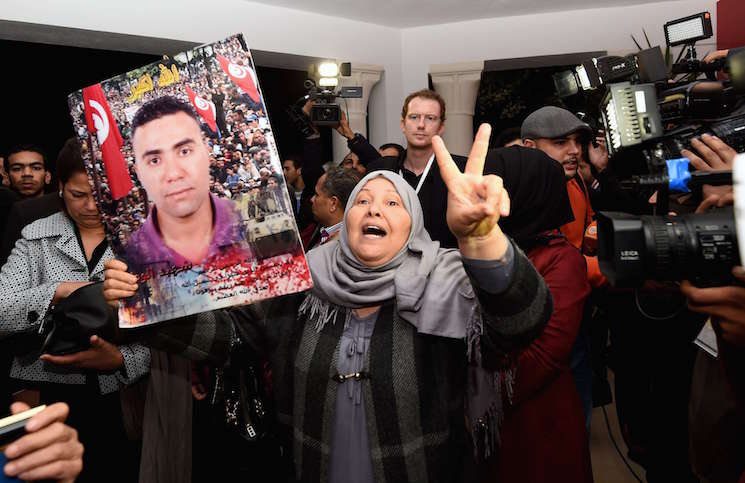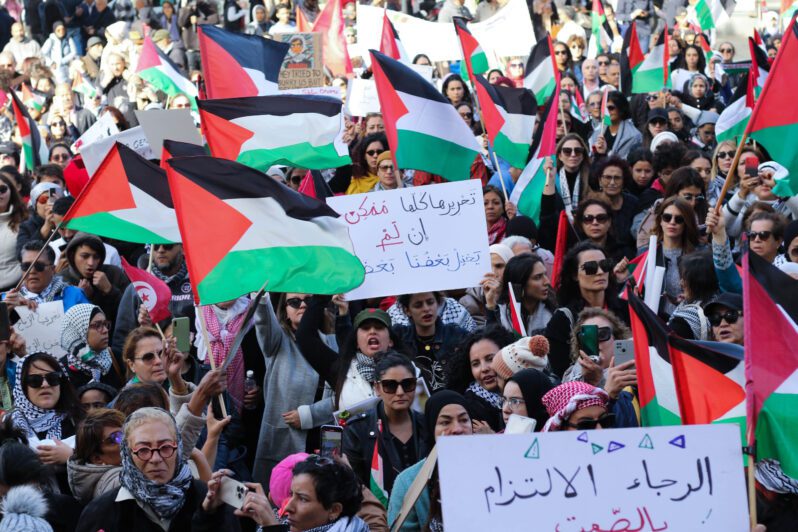Remembering Torture in Tunisia: The Path of Transitional Justice Includes Financial Corruption

Towards the end of 2016, the Truth and Dignity Commission (TDC) held four public hearings for victims of grave human rights violations committed during the period under examination. The hearings constituted a significant event since it was the first time ever that victims of the dictatorship period in Tunisia spoke about their suffering in public. The hearings included victims from all shades of the Tunisian political spectrum, and pertained to events extending from the mid–1950s up to the outbreak of the 2011 Tunisian uprising. These few victim testimonies shed light on serious human rights violations attributed to the dictatorial regime, and investigated by the TDC.[1]
Interaction with the public hearings revealed the popularity of transitional justice in Tunisia. This path, of transitional justice, is also considered by outside observers as one of the conditions for the success of the Tunisian revolution. The TDC’s impact was seen as an important breakthrough in the face of critics, indicating its ability to move forward despite external obstacles and domestic problems. Without underestimating the importance of celebrating this step, ensuring the continuation and improvement thereof also requires critical monitoring of its details so that where there is confusion, it can be corrected and eliminated; this is to ensure transitional justice is not undermined. To this end, two observations can be made.
Where is the Truth in the Speech Introducing the Testimonies?
Head of the TDC Siham Bensedrine moderated the hearings. At the beginning of each session, she made sure she gave the floor to the TDC commissioners to present the victim’s file. The commissioners’ speeches were rousing in the way they were delivered, and they all stemmed from the idea that the victims are innocent of the charges fabricated against them by the authorities. The critical fact–finding sense, [however], was missing from the speech delivered by those who are supposed to be searching for the truth. Such a speech revealed a one–sided reading by members of the TDC of the history of Tunisian political society before the uprising; a reading that restricts violence and tyranny to the system of rule, and views every dissident thereof as a democratic political fighter. This perception seems inconsistent with an objective reading of this historical period and the ethics of the political parties in that period.[2] One of the victims of human rights violations, Sami Brahem, emphasized this when he talked about the possible involvement of some victims of violations in criminal acts. He emphasized an important principle: even if the victim is involved in a criminal act, it does not justify denying them their right to a fair trial and a treatment that respects their fundamental rights. It is hoped that the TDC would change its simplistic view in its future sessions, especially as it bears, by virtue of its statute, the responsibility of rewriting the history of Tunisia.
2. Steering Clear of Addressing Financial Corruption, Was it a Choice?
On November 22, 2016, TDC Commissioner Khalid al-Krishi gave a statement to the press, saying that the perpetrators whose testimonies will be heard are seeking arbitration and reconciliation. He noted that compulsory attendance of the perpetrators is a major condition to accept the request for arbitration, adding that if they fail to show up, the TDC will suspend the arbitration and reconciliation procedures.[3]
On the hearing which was held on Dec 18, 2016, none of the perpetrators of financial crimes showed up. There was one testimony given by a person who was described as a victim of financial corruption, and that was the only time violations of this sort were talked about. The victim was a former diplomat who had previously served as an ambassador for Tunisia to the United Arab Emirates (UAE) some 15 or so years ago. The victim claimed to have suffered the consequences of judicial charges of seizure of public funds as a result of the corrupt family of former President Zine El Abidine Ben Ali.
According to his version of events, a monitoring team which was in charge of auditing the embassy’s accounting records lent their ear to local agents working there, and ended up accusing him of seizing part of the budget allocated to that kind of procedure.
The former diplomat added that the then–minister of foreign affairs offered him one of two choices as stipulated by the Tunisian president: resignation without a fuss, or judicial consequences. He chose not to resign. The ministry dismissed him. Linking the consequences he faced to corruption, the former diplomat said that upon carrying out his duties, he was informed in advance of the visits of members of Ben Ali’s family to the UAE so that he makes sure special protocol is arranged to receive them through the honors hall of the airport, without going through inspection and customs procedures. He faced consequences when he could not arrange such protocol in one visit to Dubai made by Jalila Trabelsi, sister–in–law of Ben Ali and her husband, because he was informed of the visit late. What is striking is that the diplomat, who was described as a victim for fighting corruption, mentioned that the two visitors used to illegally smuggle money from Tunisia. The diplomat’s awareness of such smuggling did not prompt him to oppose it or inform the ministry at the time. The testimony revealed how Tunisian state institutions and their high–ranking officials turned into tools to serve the president’s family. However, the testimony remained insufficient to convince the TDC that he was indeed a victim of corruption, even though it was mentioned that a court ruling had been issued before the uprising and another one after, confirming his innocence of the charge against him.
Thus, the TDC seemed aloof in connection with corruption, in comparison with human rights violations. It has failed to achieve its promises to have those involved in financial corruption crimes make public confessions. The TDC did not take any position on the reconciliation and arbitration requests submitted by them. It has also failed to present strong and multiple testimonies to expose the financial corruption of an infamously corrupt former regime. Why was that the case? Is it because the TDC failed to collect enough testimonies and evidence on corruption and to persuade victims to testify publicly, or is it due to the same multi–level endeavors to be lenient with money tycoons who are involved in corruption the most?
The details of the testimonies and those related to the historical speech of the TDC underline the need for a reformatory critical reading of transitional justice; such reading should avoid partisan discourse which might be the result of the political authority’s conflict with the TDC. Such a call for a critical reading does not undermine the important role of the public hearing sessions in keeping the memory of what happened alive.
This article is an edited translation from Arabic.
__________
[1] These include: arbitrary arrests; torture; violating the right to freedom of movement; the right to work; the right to marry; forced divorce; violating the freedom to dress; the right to travel; the right to demonstrate; the right to political activity; forced disappearance; prohibition of work; sexual assault; killing without trial; and, financial corruption.
[2] As an example of this speech, Commissioner Mohamed Ben Salem who introduced the testimony of Abdullah Bin Saleh emphasized that the only thing Bin Saleh and his friends did was hold leaflets. The testimony exposed the commissioner’s shallow reading of the historical moment of the trial. For the witness showed that he was linked to an organization which was active on Libyan soil under the name: Progressive National Front for the Liberation of Tunisia and Libya.
[3] A statement by the TDC member Khalid al-Krishi on November 11, 2016, Studio Shams, Shams FM.



